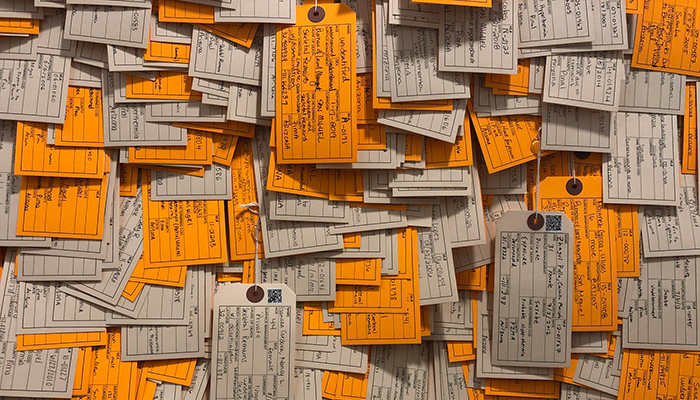
Hostile Terrain 94 (detail), 2020. Part of the Undocumented Migration Project, the Manila tags represent the identified bodies of undocumented migrants who have died crossing the border, while the orange memorialize the over 1,000 deceased who remain unknown.
Hostile Terrain 94: Reflections on Immigration and Public-Facing Anthropology
ONLINE ONLY
This is a past event
HOSTED VIA ZOOM
Register in advance for this online event.
This program will be offered in English and Spanish.
Este programa será ofrecido en inglés y español. Presione aquí para leer sobre los detalles del evento.
Jason De León discusses the origins of the Undocumented Migration Project (UMP), a nonprofit research, arts, and education collective that raises awareness of the plight of Latin American migrants attempting to enter the United States. De León shares some of his team's ongoing projects including Hostile Terrain 94, a global participatory exhibition focused on migrant death that launches in 130 locations in 2021. He also highlights his career trajectory from a Getty Marrow intern in 1999 to professor of anthropology and Chicana/o and Central American studies at the University of California, Los Angeles.
Jason De León is the head curator of Hostile Terrain 94 and executive director of the Undocumented Migration Project, Inc. He is also professor of anthropology and Chicana/o and Central American studies at the University of California, Los Angeles and author of the award-winning book The Land of Open Graves: Living and Dying on the Migrant Trail (University of California Press, 2015).
Miguel de Baca is a senior program officer at Getty Foundation, where he oversees a portfolio of academic and university-based grants. Previously, he was the chair of the Art and Art History Department at Lake Forest College, where he was also associate professor of modern and contemporary art history.
This lecture is part of the Beyond the Borders, Beyond the Boundaries series, which brings together speakers whose work expands art historical scholarship beyond the intellectual and geographic constraints that have traditionally defined it. Presented by the Getty Research Institute's Director's Office, the series' topics range from depictions of race in 18th-century painting to participatory art about undocumented migration, provoking new ways of thinking about how practices of inclusion and exclusion have shaped the field.
Visit our Exhibitions and Events page for more information and to register for these free programs.
The conversation will be available on the Getty Research Institute YouTube channel following the event.